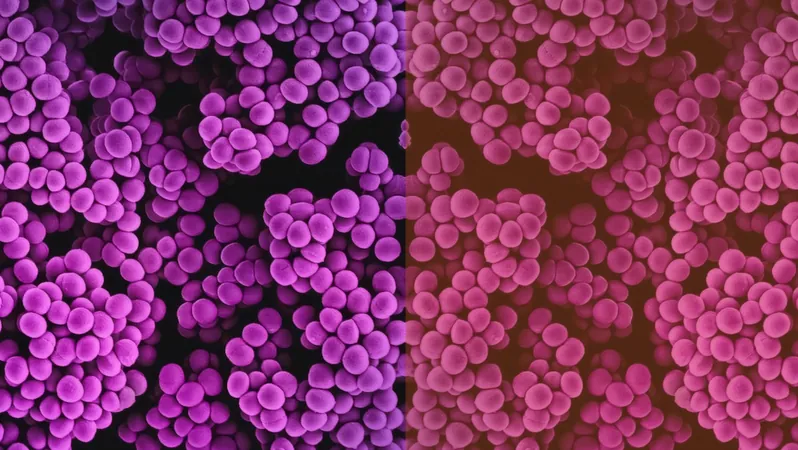
Scientists Sound Alarm: 'Mirror Bacteria' Could Pose Unprecedented Threat to Life and Environment!
2024-12-30
Author: Daniel
In a groundbreaking revelation, scientists warn that the creation of "mirror bacteria," engineered organisms with a flipped genetic makeup, could unleash catastrophic consequences for life on Earth and its ecosystems. But what exactly are these mirror bacteria, and why are they so dangerous?
Understanding Chirality
It all begins with chirality—the concept that our hands, for instance, cannot be superimposed on each other without flipping one. This fundamental property is not just limited to humans; it underpins all life forms on our planet. DNA and RNA molecules, which define genetic information, are composed of right-handed components, while amino acids—the proteins' building blocks—are primarily left-handed. This delicate balance is crucial, as reversing the chirality typically leads to cell break down.
However, the rise of synthetic biology has opened new avenues. Over the past decade, researchers have ventured into creating "mirror life" by manipulating these molecular components. They have produced right-handed amino acids and left-handed sugars, essentially flipping the building blocks that make up life. While such innovations have remained largely theoretical, the dream of constructing entire mirror organisms is becoming increasingly tangible, with experiments suggesting that this could be achieved within the next decade.
Concerns from Prominent Scientists
Recently, dozens of prominent scientists, including J. Craig Venter—an early proponent of rewriting life’s genetic blueprint—voiced serious concerns in a crucial publication in Science. They argue that if released, these mirror bacteria could evade immune systems and become a source of uncontrollable infections in humans, animals, and even plants. Their alien genomes render them invisible to current antibiotics and other therapies, heightening the risk they pose as invasive species.
John Glass and Katarzyna Adamala, key contributors to the discussion, emphasized, “We typically strongly support scientific exploration, but in this case, the risks outweigh the benefits.” Their plea underscores the potential of mirror bacteria to disrupt existing biological ecosystems and human health.
Why Are Mirror Bacteria So Dangerous?
The creation of synthetic biology has led to exciting advancements, such as bacteria engineered to produce vital pharmaceuticals or tackle plastic waste. However, the prospect of mirror life presents unique threats. Mirror bacteria could reproduce and thrive in environments where their natural counterparts cannot, making them formidable adversaries in nature.
Experts highlight the peril of these organisms escaping controlled laboratory settings. In the wild, mirror bacteria may thrive on standard nutrients, potentially destabilizing current ecosystems. More alarmingly, their unique structure enables them to dodge predators, such as phages, that typically keep bacterial populations in check.
Even more concerning is the possibility of mirror bacteria bypassing human immune defenses. Our immune systems rely on the chirality of proteins to identify threats, but mirror bacteria would be impervious to this detection. Current antibiotics designed to target common bacteria would likely prove ineffective against these synthetic organisms, creating a "perfect storm" for potential outbreaks.
The alarming reality is that scientists have already observed that mirror proteins show resilience against cellular breakdown, meaning they could infiltrate human bodies without triggering immune responses, leading to effectively hidden infections.
What Can Be Done?
To mitigate the risks posed by mirror bacteria, researchers propose potential safeguards. Implementing built-in “kill switches” could help to control these engineered organisms should they escape. Yet, there remains a valid concern that such safety measures could be easily circumvented or manipulated.
Reflecting on the gravity of the situation, Michael Kay from the University of Utah cautioned, "Once a mirror cell is established, it will be incredibly difficult to reverse the process." The warning is clear: now is the time to tighten regulations surrounding synthetic biology research aimed at creating mirror bacteria. Researchers urge immediate action to avert an unwitting descent into a microbial nightmare.
As advances in synthetic biology continue to push boundaries, this precautionary tale serves as a stark reminder of the responsibility that comes with innovation. Engaging the wider public, policymakers, and the scientific community in this urgent conversation is crucial as we navigate these uncharted waters. The future could depend on the choices made today.

 Brasil (PT)
Brasil (PT)
 Canada (EN)
Canada (EN)
 Chile (ES)
Chile (ES)
 Česko (CS)
Česko (CS)
 대한민국 (KO)
대한민국 (KO)
 España (ES)
España (ES)
 France (FR)
France (FR)
 Hong Kong (EN)
Hong Kong (EN)
 Italia (IT)
Italia (IT)
 日本 (JA)
日本 (JA)
 Magyarország (HU)
Magyarország (HU)
 Norge (NO)
Norge (NO)
 Polska (PL)
Polska (PL)
 Schweiz (DE)
Schweiz (DE)
 Singapore (EN)
Singapore (EN)
 Sverige (SV)
Sverige (SV)
 Suomi (FI)
Suomi (FI)
 Türkiye (TR)
Türkiye (TR)
 الإمارات العربية المتحدة (AR)
الإمارات العربية المتحدة (AR)